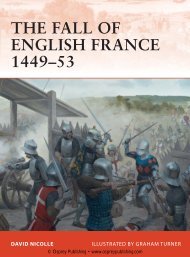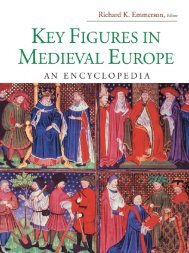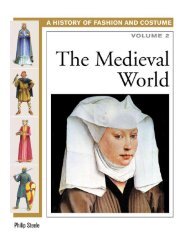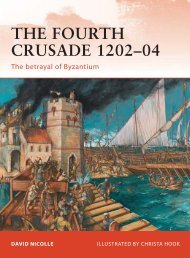Osprey - General Military - Knight - The Warrior and ... - Brego-weard
Osprey - General Military - Knight - The Warrior and ... - Brego-weard
Osprey - General Military - Knight - The Warrior and ... - Brego-weard
You also want an ePaper? Increase the reach of your titles
YUMPU automatically turns print PDFs into web optimized ePapers that Google loves.
were elite societies: only the nobility were permitted, although they emphasized the<br />
sense ol brotherhood amongst members that levelled the distinctions between greater<br />
<strong>and</strong> lesser knights. <strong>The</strong>y were also militant; their members were expected to be active<br />
in war <strong>and</strong> tournament, <strong>and</strong> many of the orders had badges that were to be augmented<br />
in recognition of deeds performed on the battlefield, or had tables of honour at their<br />
meetings where those who achieved the greatest feats were to take their place.<br />
<strong>The</strong> ethos of the secular orders was steeped in romance literature. <strong>The</strong> Order ol the<br />
Garter drew heavily on the Arthurian myths. Edward instituted the Order's great<br />
feast to be held at Windsor which, legend had it, had been originally built by Arthur<br />
himself. <strong>The</strong> Order of the Golden Fleece, the Touton d'Or, created by Philip the Good,<br />
Duke ot Burgundy in 1430, drew inspiration from the classical tale of Jason <strong>and</strong> the<br />
Argonauts, mixed with the biblical story of Gideon's fleece.<br />
<strong>The</strong> idea of courtouie found its way into warfare <strong>and</strong> campaign. During the siege<br />
of the Norman town of Le Mans by Helias, Count of Maine in 1100 the two sides<br />
daily exchanged jokes <strong>and</strong> insults <strong>and</strong> the count had safe passage into the citadel where<br />
he was able to spend time in conversation with the defenders, assured of his safely<br />
because of the garrison's good faith <strong>and</strong> honour. When the castle was given permission<br />
to surrender, the garrison were able to march out with their arms <strong>and</strong> were received<br />
not as prisoners but as 'faithful friends'. When the knight William de Gr<strong>and</strong>court<br />
captured the rebel count Amauiy de Montfort at Bourgtheroulde in 1124, during the<br />
war between Henry II <strong>and</strong> his nephew William Clito, de Gr<strong>and</strong>court chose to desert<br />
the king, ab<strong>and</strong>on his own l<strong>and</strong>s <strong>and</strong> go into exile rather than condemn the noble<br />
count to perpetual prison ', Amauiy's inevitable fate if de Gr<strong>and</strong>court had h<strong>and</strong>ed him<br />
over to Henry as he ought to have done. After the battle of Poitiers the Black Prince<br />
displayed his LirgeJde by providing dinner for his prisoners, <strong>and</strong> serving King Jean of<br />
France himself.<br />
<strong>The</strong> final major influence on the development of chivalry was the Church. <strong>The</strong> two<br />
ideologies did not fit easily with each other. Christianity's origins were pacifist.<br />
<strong>The</strong> writings of the earliest Christian theologians had all argued that war <strong>and</strong> violence<br />
were incompatible with following Christ. However the adoption of the Christian<br />
religion by the Roman emperors, first by Constantine around 317, <strong>and</strong> its eventual<br />
establishment as the official religion of the Roman Empire by <strong>The</strong>odosius II in the<br />
fifth century, forced a rethink on the matter. Fortunately, whilst the New Testament<br />
was predominantly pacifist, there were passages in which the soldier was accepted<br />
rather than condemned, <strong>and</strong> the Old Testament held the image of God as the Lord of<br />
Hosts, a bnnger of military victory to the laithful.<br />
<strong>The</strong> writings of the fourth-century theologian Saint Augustine of Hippo on<br />
the matter, as on so much else in early Christian doctrine, had a huge impact upon the<br />
CHIVALRY: THE KNIGHTLY CODE -







